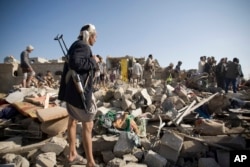The U.S. Senate defeated a resolution disapproving an arms sale to Saudi Arabia after hours of contentious floor debate that aired sharp criticism of Riyadh and revealed rifts among lawmakers about America's relationship with its longtime Middle Eastern ally.
Wednesday's 71-to-27 vote to set aside the resolution all but assured that the $1.15 billion arms sale of Abrams tanks and other equipment can go forward without congressional interference.
A bipartisan group of senators opposed the transaction based on Saudi actions in neighboring Yemen and the kingdom's backing of a fundamentalist version of Islam.
Democrat Chris Murphy of Connecticut said that with U.S. backing, Saudi Arabia has targeted Yemeni civilian populations in a bombing campaign against Houthi rebels.
"We've begged them to stop bombing civilians, and yet in a 72-hour period earlier this summer, the Saudi-led coalition bombed another Doctors Without Borders facility, a school, and the principal's house next door," Murphy said.
"It [the resolution] is about whether we will be complicit in a war in Yemen," said Republican Senator Rand Paul of Kentucky. "There are said to be 3,000 innocent people who have died in Yemen from Saudi bombs.
"When 100 people die at a wedding in Yemen, what do you think happens to those families? Do you think they have a warm fuzzy feeling for Saudi Arabia and the United States?" Paul added.
‘No evidence’ of Yemen targets
Resolution opponents said the measure is misguided.
"We've been selling ground combat equipment to Saudi Arabia for decades," said Majority Leader Mitch McConnell, a Kentucky Republican. "There is no evidence, none, that the Saudis have used the Abrams tank and ground combat [equipment] within Yemen. These systems have been used along the Saudi border to defend against Houthi incursions."
Another Republican, John McCain of Arizona, put the question in geo-strategic terms.
"Let's be clear what the arms sale is all about. It's about giving a nation that's under attack by Iranian-sponsored militia the arms that it needs to defend its people and its territory," McCain said. "Blocking this sale of tanks will be interpreted by our Gulf partners — not just Saudi Arabia — as another sign that the United States of America is abandoning our commitment to the region."
Links to extremism
Beyond human rights concerns, Murphy argued the United States should signal its disapproval of Saudi Arabia's backing of Wahhabism beyond its borders.
"If we remain silent on the primary progenitor of this brand of Islam that feeds into extremism, how can you say you are serious about strangling ISIL when the textbooks that are produced inside Saudi Arabia are the very same textbooks that are handed out to recruit suicide bombers?" Murphy asked, using an acronym for Islamic State.
Issue of alliances
Whatever Saudi Arabia's faults, its defenders in the Senate stressed that the kingdom is a critical ally in a turbulent region.
"If you want to send a signal to the Ayatollah [in Iran] that America is out of the fight and we are no longer a reliable ally, stop helping Saudi Arabia and the Gulf Arab states that have been helping us, as imperfect as they may be," said Republican Lindsey Graham of South Carolina.
"Voting against this arms sale is not going to end — it's not going to even permanently damage — our relationship with Saudi Arabia," Murphy countered. "We are allies; we'll continue to be allies."
Proponents of the arms sale noted that the weapons are being purchased entirely with Saudi funds, not U.S. aid, and that Riyadh could buy similar weapons from other nations if the sale were blocked.
The arms sale is not the only issue that has Saudi Arabia under a microscope on Capitol Hill. Earlier this year, Congress passed a bill allowing foreign sponsors of terrorist attacks on U.S. soil to be sued in American courts.
Although the bill specifies no nation, it is widely seen as an effort to end Saudi Arabia's immunity from lawsuits pertaining to the terrorist attacks of Sept. 11, 2001.
The White House said President Barack Obama intends to veto the legislation, which likely would trigger votes to override in both houses of the Republican-led Congress.






